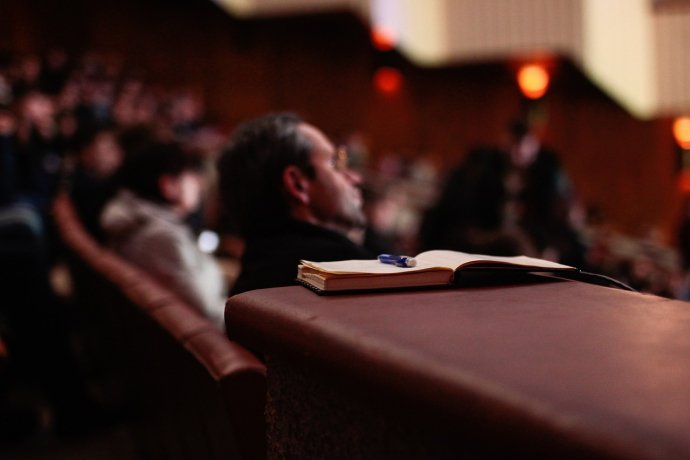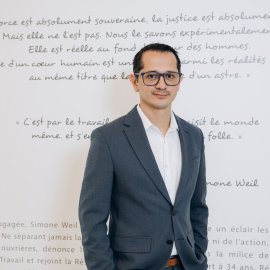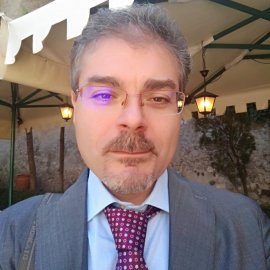
Mardi 19 et mercredi 20 mars 2024
RÉSUMÉ :
L’idée de la modernité a fait l’objet de réflexions approfondies et de nombreuses
discussions. Au cours du XXe siècle bien des penseurs (de Heidegger à Blumenberg, de Sartre à Foucault) ont cherché à définir la modernité et en ressaisir l’esprit. Certains auteurs – notamment Weber – ont essayé de repenser la narration conventionnelle de la modernité occidentale en insistant sur le « désenchantement » du monde : dans cette perspective, l’avènement de la modernité se caractérise surtout par le développement d’une rationalisation progressive de toutes les sphères de la vie. D’autres ont prétendu identifier la marque déterminante de la modernité capable d’expliquer à elle seule les phénomènes essentiels des Temps Modernes (pour Heidegger, par exemple, la représentation est la détermination de l’époque moderne). D’autres encore ont questionné, dans le sillage de Marx, les enjeux de la philosophie moderne dans son rapport aux transformations économiques, politiques et sociales de la modernité (c’est le cas par exemple de Lukács, Horkheimer, Adorno).
Toutefois, à l’époque actuelle la question de la modernité – sa/es généalogie/s, sa présumé essence – ne peut être thématisée sans se confronter au paradigme décolonial. Les auteurs qui se réclament de ce paradigme ont entrepris un travail de véritable remise en question du concept et de la narrative européenne de « modernité » en mettant au jour sa face caché. Or, selon les penseurs décoloniaux (Dussel, Quijano, Mignolo, etc.), les auteurs qui élaborent une critique de la modernité occidentale n’ont pas vraiment remis en question l’horizon colonial où se constituent les subjectivités modernes. À cet égard, force est de s’interroger sur les dynamiques de pouvoir et sur les dispositifs culturels qui ont contribué à la naissance de la catégorie de modernité et des concepts qui lui sont associés (rationalité, rationalisation, marché, etc.) en s’appropriant non seulement les clefs d’analyse et les outils intellectuels de la Théorie critique mais aussi ceux de la pensée décoloniale.
Selon Dussel, la modernité est un phénomène européen, mais elle est ancrée dans une relation dialectique avec une altérité non-européenne qui en est la matière ultime. En effet, la « modernité » en tant que nouveau modèle de la vie quotidienne et de la connaissance émerge, à la fin du XVe siècle, en relation avec le contrôle de l’Atlantique : l’ego cogito moderne et cartésien dont Horkheimer montre les liens avec la constitution de la mentalité bourgeoise (« Théorie traditionnelle et théorie critiqué », 1937) a été devancé par l’ego conquiro hispano-portugais. La modernité est donc, selon Dussel, cet événement paradoxal dans lequel se mêlent émancipation et colonisation – cette dernière constituant le côté obscur (et caché) de la modernité.
À partir de cet horizon théorique et des enjeux politiques et culturels qu’il englobe, le colloque se propose de faire le point sur certains questions urgentes débattues dans le cadre de la pensée décoloniale, de thématiser à nouveaux frais les rapports entre l’approche décoloniale et la théorie critique de la tradition européenne, de repenser certaines reconstructions postérieures qui ont engendré le « mythe de la modernité » (Dussel).
PROGRAMME :
• Mardi 19 mars
14h00 - Accueil des participants
Mots d’ouverture par Luis Mora Rodriguez (IEA de Nantes) et Alain-Patrick Olivier (Collège International de Philosophie)
14h15 - Raffaele Carbone (Università di Napoli Federico II/Collège International de Philosophie)
Introduction : l’approche décoloniale comme clé de compréhension de la modernité
Séance 1
La pensée décoloniale : état des lieux et discussions actuelles
Président de séance : Luis Mora Rodriguez (University of Costa Rica/IEA de Nantes)
14h45 - Laura Catelli (Instituto de Estudios Críticos en Humanidades, Universidad Nacional de Rosario-CONICET, Argentine)
Mestizaje y colonialidad. Notas sobre raza, sangre y sexualidad
15h15 - Elsa Dorlin (Université Toulouse Jean Jaurès)
Avec quelle bibliothèque et en quelle langue pensons-nous la décolonialité ? Critique décoloniale et radicalisme noir guyano-antillais
15h45 - Discussion et pause
16h30 - Pauline Vermeren (LCSP-université Paris Cité/Collège International de Philosophie)
Race, modernité et théorie décoloniale en philosophie
17h00 - Karina Bidaseca (University of Buenos Aires/University of San Martin & CONICET, Argentina)
Poetics of the relationship, immersive landscapes and the right to opacity
17h30 - Discussion
20h00 - Dîner du colloque
• Mercredi 20 mars
Séance 2
Modernité, théorie critique et pensée décoloniale
Président de séance :
Alain-Patrick Olivier (Nantes Université/Collège International de Philosophie)
9h30 - Luca Scafoglio (Università di Salerno)
Domination and the Land: The Conquest as a Matrix of Modernity – Between Critical Theory and Decolonial Option
10h00 - Livio Boni (Collège International de Philosophie)
Un Francfortois en Inde : une introduction à l’œuvre d’Ashis Nandy
10h30 Discussion et pause
11h15 - Alejandro José de Oto (Consejo Nacional de Investigaciones Científicas y Técnicas/Conicet, Argentine)
Coloniality and historiography. The politics of time / Colonalidad e historiografia. Las políticas del tiempo
11h45 - Raphaël Barbey (Académie de Nantes), Claude Bourguignon Rougier (traductrice), Mathieu Renault (Université Toulouse Jean Jaurès), Guillaume Sibertin-Blanc (Université Paris 8 – Vincennes Saint-Denis)
Les mythologiques de 1492
12h15 - Discussion
12h45 - Déjeuner du colloque
Séance 3
Philosophie et sociologie au prisme de la théorie décoloniale : deux études de cas
Président de séance :
Raffaele Carbone (Università di Napoli Federico II)
14h30 - Leonardo Moreira (Université Paris 1 Panthéon-Sorbonne)
Rousseau, anticolonialisme et théorie de la non-domination
15h00 - Edoardo Massimilla (Università di Napoli Federico II)
Se e in che senso « la sociologia storica » di Max Weber può dirsi eurocentrica ?
15h30 - Discussion
16h00 - Luis Mora Rodriguez (University of Costa Rica/IEA de Nantes)
Conclusion
16h30 Fin du colloque
Colloque organisé avec le soutien de l’Institut d'études avancées de Nantes, du Collège International de Philosophie et de l’Université Federico II de Naples.
"Genealogy(ies) and Deconstruction(s) of Modernity: Crossed Perspectives
led by Raffaele Carbone, Fellows 22/23 of the Institute and Luis Mora Rodriguez, Director of the Institute.
Tuesday 19 and Wednesday 20 March 2024
Open to the public upon registration via this link
https://forms.gle/MgewFNKHHPDjaoNB7
SUMMARY:
The idea of modernity has been the subject of much thought and discussion.
discussed. In the course of the twentieth century, many thinkers (from Heidegger to Blumenberg, from Sartre to Foucault) have sought to define modernity and recapture its spirit. Some authors - notably Weber - have tried to rethink the conventional narrative of Western modernity by emphasising the 'disenchantment' of the world: from this perspective, the advent of modernity is characterised above all by the development of a progressive rationalisation of all spheres of life. Others have sought to identify the defining mark of modernity, capable in itself of explaining the essential phenomena of the Modern Age (for Heidegger, for example, representation is the defining feature of the Modern Age). Still others, following in Marx's footsteps, have questioned what is at stake in modern philosophy as it relates to the economic, political and social transformations of modernity (as in the case of Lukács, Horkheimer and Adorno).
However, in today's world, the question of modernity - its genealogy(ies), its presumed essence - cannot be addressed without confronting the decolonial paradigm. Authors who claim to be part of this paradigm have undertaken a genuine challenge to the European concept and narrative of 'modernity' by bringing its hidden face to light. Yet, according to decolonial thinkers (Dussel, Quijano, Mignolo, etc.), the authors who develop a critique of Western modernity have not really questioned the colonial horizon in which modern subjectivities are constituted. In this respect, we need to look at the dynamics of power and the cultural mechanisms that have contributed to the emergence of the category of modernity and the concepts associated with it (rationality, rationalisation, the market, etc.), drawing not only on the analytical keys and intellectual tools of critical theory but also on those of decolonial thought.
According to Dussel, modernity is a European phenomenon, but it is rooted in a dialectical relationship with a non-European otherness that is its ultimate material. Indeed, "modernity" as a new model of everyday life and knowledge emerged at the end of the fifteenth century in relation to the control of the Atlantic: the modern Cartesian ego cogito, whose links with the constitution of the bourgeois mentality Horkheimer shows ("Théorie traditionnelle et théorie critiqué", 1937), was pre-empted by the Spanish-Portuguese ego conquiro. According to Dussel, modernity is therefore a paradoxical event in which emancipation and colonisation are intertwined - the latter constituting the dark (and hidden) side of modernity.
On the basis of this theoretical horizon and the political and cultural issues it encompasses, the colloquium aims to take stock of some of the urgent questions debated in decolonial thought, to take a fresh look at the relationship between the decolonial approach and the critical theory of the European tradition, and to rethink some of the later reconstructions that gave rise to the 'myth of modernity' (Dussel).
PROGRAMME :
• Tuesday 19th March
14:00 - Welcome of participants
Opening remarks by Luis Mora Rodriguez (IEA Nantes) and Alain-Patrick Olivier (Collège International de Philosophie)
14:15 - Raffaele Carbone (Università di Napoli Federico II/Collège International de Philosophie)
Introduction: the decolonial approach as a key to understanding modernity
Session 1
Decolonial thought: the current state of play and current discussions
Session chaired by Luis Mora Rodriguez (University of Costa Rica/IEA de Nantes)
14:45 - Laura Catelli (Instituto de Estudios Críticos en Humanidades, Universidad Nacional de Rosario-CONICET, Argentina)
Mestizaje y colonialidad. Notas sobre raza, sangre y sexualidad
15:15 - Elsa Dorlin (Toulouse Jean Jaurès University)
With what library and in what language do we think about decoloniality? Decolonial criticism and black Guyanese-Caribbean radicalism
3.45pm - Discussion and break
16h30 - Pauline Vermeren (LCSP-Université Paris Cité/Collège International de Philosophie)
Race, modernity and decolonial theory in philosophy
17h00 - Karina Bidaseca (University of Buenos Aires/University of San Martin & CONICET, Argentina)
Poetics of the relationship, immersive landscapes and the right to opacity
17h30 - Discussion
20:00 - Conference dinner
• Wednesday 20th March
Session 2
Modernity, critical theory and decolonial thought
Chair:
Alain-Patrick Olivier (Nantes University/International College of Philosophy)
9:30 - Luca Scafoglio (Università di Salerno)
Domination and the Land: The Conquest as a Matrix of Modernity - Between Critical Theory and Decolonial Option
10:00 - Livio Boni (Collège International de Philosophie)
A Frankfurt man in India: an introduction to the work of Ashis Nandy
10:30 Discussion and break
11:15 - Alejandro José de Oto (Consejo Nacional de Investigaciones Científicas y Técnicas/Conicet, Argentina)
Coloniality and historiography. The politics of time / Colonalidad e historiografia. Las políticas del tiempo
11:45 - Raphaël Barbey (Académie de Nantes), Claude Bourguignon Rougier (translator), Mathieu Renault (Université Toulouse Jean Jaurès), Guillaume Sibertin-Blanc (Université Paris 8 - Vincennes Saint-Denis)
The mythologies of 1492
12.15pm - Discussion
12.45pm - Conference lunch
Session 3
Philosophy and sociology through the prism of decolonial theory: two case studies
Chair:
Raffaele Carbone (Università di Napoli Federico II)
2.30 pm - Leonardo Moreira (Université Paris 1 Panthéon-Sorbonne)
Rousseau, anti-colonialism and the theory of non-domination
15:00 - Edoardo Massimilla (Università di Napoli Federico II)
Se e in che senso 'la sociologia storica' di Max Weber può dirsi eurocentrica?
15:30 - Discussion
16h00 - Luis Mora Rodriguez (University of Costa Rica/IEA de Nantes)
Conclusion
16:30 End of the conference
Conference organised with the support of the Institut d'études avancées de Nantes, the Collège International de Philosophie and the University Federico II of Naples.

